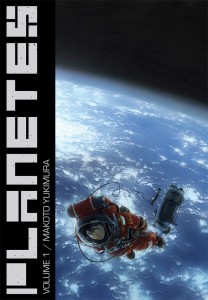By Makoto Yukimura. Released in Japan by Kodansha, serialized in the magazine Weekly Morning. Released in North America by Dark Horse Comics.
The 2nd omnibus volume of Planetes has as many powerful moments as the first, including possibly the most iconic marriage proposal in all of manga. But, just like its subject, one gets the feeling that the series has proven a bit too big for its author. The 2nd half of the series has a series of story arcs that feel like endings, but it keeps going on for a bit, and reminds me somewhat of a series that has been extended by its editors rather than its author. Of course, this offers us the opportunity for a magnificent arc focusing on fee, so I shouldn’t complain too much. But space has no ending, and neither does Planetes, which simply keeps rolling along till the very last page.
Of course, Hachimaki is still the star, and after his vision quest he’s almost a different person, though it’s touch and go as to whether he’ll survive at all – not that he did himself any damage, but he seems to have lost the will do live his life, something that Sally has to bully out of him with a combination of yelling and nudity. Moreover, he needs someone like Tanabe, even if marrying means they immediately won’t see each other again for seven years. The aforementioned marriage proposal, done as a game of shiritori, is justifiably famous, but I think may be surpassed by two other scenes – Hachimaki comforting a sobbing Tanabe as she reveals she has no idea what she can possibly write in her will should she be killed in space, and Tanabe’s complete inability to explain why she loves Hachimaki or why she married him – except that she loves him a lot. Tanabe is still the heart of this series.
And then there’s Fee. (Sorry, Yuri, you are forever “the other one”.) Fee has always tried to avoid making the personal political, probably as it’d be so easy for her to do, as we find out here. But with the world superpowers waving their dicks around and blowing up so much stuff in space that an entire orbit is now forever lost, even one person finds it hard to make a difference. We contrast adult Fee’s attempts to balance a job, a family life, and a newfound, unwanted fake with Fee’s childhood, which she liked to spend with her uncle out in his shack in the woods. This allows Planetes to take on the quiet racism of the countryside, adding in a handful of prejudice against the mentally disabled as well. It’s handled with a surprisingly gentle touch, and also allows Fee to realize that she and her son are far more alike than she’d like, but also that she belongs in space.
There’s more I haven’t touched on – Locksmith continues to be a very ambiguous villain, and Hachi’s father gets a nice flashback chapter. But as I said, the manga does not end, but keeps flowing onward till the last page. Hachi’s message to the Earth from Jupiter reflects that, talking about the need to explore space, and how it needs to be done while not losing sight of humanity. It’s a subtle rebuke to Locksmith, and also a great, down-to-earth speech. Planetes remains one of the best space-oriented titles out there, and I’d recommend it to any reader.


